|
De Chinese schrijver Gao Xingjian werd geboren op 4 januari 1940 in Ganzhou, in de provincie Jiangxi. Zie ook alle tags voor Gao Xingjian op dit blog.
Uit: Soul Mountain (Vertaald door Mabel Lee)
“In the North, it is already late autumn. Here, however, the summer heat hasn’t completely subsided. Before sunset, it is still quite hot in the sun and sweat starts running down your back. You leave the station to look around. There’s nothing nearby except for the little inn across the road. It’s an old style building with a wooden shopfront and an upstairs. Upstairs the floorboards creak badly but worse still is the grime on the pillow and sleeping mat. To wash, you’d have to wait till it was dark to strip off and pour water over yourself in the damp narrow courtyard. This is a stopover for the village peddlers and craftsmen.
It’s well before dark, so there’s plenty of time to find somewhere clean. You walk down the road with your backpack to look over the little town, hoping to find some indication, a billboard or a poster, or just the name "Lingshan" to tell you you’re on the right track and haven’t been tricked into making this long excursion. You look everywhere but don’t find anything. There were no tourists like you amongst the other passengers who got off the bus. Of course you’re not that sort of tourist, it’s just what you’re wearing: strong sensible sports shoes and a backpack with shoulder straps, no-one else is dressed like you. Of course, this isn’t one of the tourist spots frequented by newlyweds and retirees. Those places have been transformed by tourism, coaches are parked everywhere and tourist maps are on sale. Tourist hats, tourist T-shirts, tourist singlets and tourist handkerchiefs bearing the name of the place are in all the little shops and stalls, and the name of the place is used in the trade names of all the "foreign exchange currency only" hotels for foreigners, the "locals with references only" hostels and sanatoriums, and of course the small private hotels competing for customers. You haven’t come to enjoy yourself in one of those places on the sunny side of a mountain where people congregate just to look at and jostle one another, and to add to the litter of melon rind, fruit peel, soft drink bottles, cans, cartons, sandwich wrappings and cigarette butts. Sooner or later this place will also boom but you’re here before they put up the gaudy pavilions and terraces, before the reporters come with their cameras, and before the celebrities come to put up plaques with their calligraphy. You can’t help feeling rather pleased with yourself yet you’re anxious. There’s no sign of anything here for tourists, have you made a blunder? You’re only going by the map on the cigarette box in your shirt pocket, what if the expert amateur you met on the train had only heard about the place on his travels?“
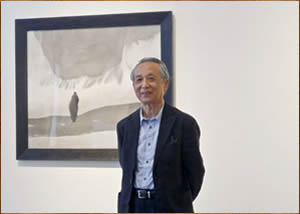
Gao Xingjian (Ganzhou, 4 januari 1940)
De Amerikaanse dichter, songwriter en frontman van Silver Jews David Berman werd geboren op 4 januari 1967 in Williamsburg, Virginia. Zie ook alle tags voor David Berman op dit blog.
The Charm Of 5:30 (Fragment)
You know what I'm talking about,
and that's the kind of fellowship that's taking place in town, out in
the public spaces. You won't overhear anyone using the words
"dramaturgy" or "state inspection today. We're too busy getting along.
It occurs to me that the laws are in the regions and the regions are
in the laws, and it feels good to say this, something that I'm almost
sure is true, outside under the sun.
Then to say it again, around friends, in the resonant voice of a
nineteenth-century senator, just for a lark.
There's a shy looking fellow on the courthouse steps, holding up a
placard that says "But, I kinda liked Reagan." His head turns slowly
as a beautiful girl walks by, holding a refrigerated bottle up against
her flushed cheek.
She smiles at me and I allow myself to imagine her walking into
town to buy lotion at a brick pharmacy.
When she gets home she'll apply it with great lingering care before
moving into her parlor to play 78 records and drink gin-and-tonics
beside her homemade altar to James Madison.
In a town of this size, it's certainly possible that I'll be invited over
one night.
In fact I'll bet you something.
Somewhere in the future I am remembering today. I'll bet you
I'm remembering how I walked into the park at five thirty,
my favorite time of day, and how I found two cold pitchers
of just poured beer, sitting there on the bench.
I am remembering how my friend Chip showed up
with a catcher's mask hanging from his belt and how I said
great to see you, sit down, have a beer, how are you,
and how he turned to me with the sunset reflecting off his contacts
and said, wonderful, how are you.
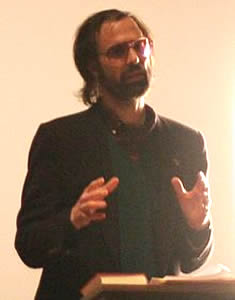
David Berman (Williamsburg, 4 januari 1967)
De Zwitserse schrijver Emil Zopfi werd geboren op 4 januari 1943 in Wald. Zie ook alle tags voor Emil Zopfi op dit blog.
Uit: Steinschlag
„Blickte auf die Frau hinab, die da lag als ob sie jemand hingebettet hätte, den Kopf an der Kante zur Seite geneigt, den Körper ausgestreckt, die Beine übereinander geschlagen.
So liegt man nicht, wenn man gestürzt ist, war Andreas erster Gedanke. Das Stirnband, im gleichen Violett wie die Faserpelzjacke, war der Toten über einem Ohr hochgerutscht. Blut war durch die Haare gesickert und im Schotter zu einer dunklen Kruste geronnen. Amstad stand neben ihr, die Hände ineinander verklammert, in Schweigen versunken. Vielleicht betet er, dachte Andrea. Vielleicht ist es hier der Brauch, dass der Führer ein Gebet spricht, wenn er am Berg einem toten Menschen begegnet.
«Was denkst du, wie ist es passiert?», fragte sie nach einer Weile, um das Schweigen zu brechen. Amstad trat einen Schritt zurück, zündete sich eine Zigarette an. Sein Gesicht wirkte grau und müde.
«Steinschlag», stieß er hervor. Das Wort klang so hart, als sei es selber ein Stein, der sich löst, fällt und aufschlägt. Sein linkes Augenlid zuckte, als er es aussprach.
«Steinschlag?»
Andrea zog den Kopf ein und warf einen Blick den steilen Hang hinauf. Es war Sommer, doch in den Schluchten der Felswand, die sich über ihnen im Nebel erhob, lagen noch Schneereste. Schmelzwasser konnte Steine mitreißen und sie über die Schutthalden bis auf den Fußpfad schleudern. Durch die Runse rauschte ein Bach, sodass man ihr Aufschlagen kaum rechtzeitig hören und sich in Sicherheit bringen konnte.
«Steinschlag? Sie ist also auf dem Weg getroffen worden. Wie ist sie denn auf das Felsband gekommen? Gestürzt? In dieser Lage liegen geblieben? Wie stellst du dir das vor?»
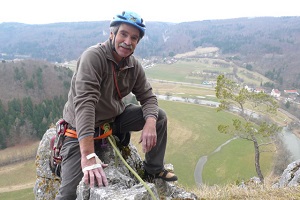
Emil Zopfi (Wald, 4 januari 1943)
De Duitse journalist, schrijver, film- en literair criticus en hoogleraar theaterwetenschap Hellmuth Karasek werd geboren op 4 januari 1934 in Brno, Moravië, Tsjechoslowakije. Zie ook alle tags voor Hellmuth Karasek op dit blog.
Uit:Soll das ein Witz sein?
„Adam, inzwischen Vater von zwei Jungen, hat die Einsicht: »Es lebt sich besser außerhalb des Gartens (gemeint ist der Garten Eden) mit ihr als drinnen ohne sie.« Über diesen Ehewitz lässt Sich lachen. Und am Ende von Evas Tagebuch, vierzig Jahre später, sitzt Adam an Evas Grab und sagt: »Wo immer sie war, da war das Paradies.« Auch hier gibt es wieder Grund zum Lachen.
Dabei hatte Adam, in der Friedfertigkeit des Paradieses, also im Himmel auf Erden, auf einer Reise erfahren, wann seine lebendige Rippe von der verbotenen Frucht der Erkenntnis gegessen hatte – als nämlich die wilden Tiere, die in totaler Harmonie nebeneinander grasten und ästen, übereinander herfielen, sich zerfleischten, ihm sein Pferd töteten, sodass er nur mit Mühe und Not mit dem Leben davonkam.
Jonathan Swift, wie Mark Twain als Kinderbuchklassiker ausgewiesen, ein Humorist von misanthropischen Gnaden, hat eine Kannibalengeschichte geschrieben, die während des ewigen Kolonialkriegs zwischen England und Irland im 17. Jahrhundert spielt. Darin macht er einen bescheidenen Vorschlag: »a modest proposal«. Die Briten, die reichen Gutsbesitzer, mögen doch als kulinarische Abwechslung die von Hungertod bedrohten irischen Babys der Tagelöhner verspeisen, sie würden sicher köstlich schmecken.
Mit diesem extremen Beispiel will ich deutlich machen, warum auf Erden (im Unterschied zum Himmel oder zu jedem vorstellbaren Paradies) gelacht wird, ja gelacht werden muss – weil nämlich das Elend dieser Welt ohne Lachen nicht auszuhalten wäre.
Im Himmel braucht man kein Lachen. Auf der Erde aber haben wir es bitter nötig. Wie das Sprichwort weiß: Humor ist, wenn man trotzdem lacht. Trotzdem. Auf das Trot z d e m kommt es an. Wir brauchen das Lachen, um die Welt aushalten zu können. Das klingt zwar pathetisch, ist aber zweifellos wahr.“

Hellmuth Karasek (4 januari 1934 - 29 september 2015)
De Vlaamse dichter en (toneel)schrijver Fernand Handtpoorter werd geboren in Poperinge op 4 januari 1933. Zie ook alle tags voor Fernand Handtpoorter op dit blog.
Foto's
Hij kijkt naar foto's uit de jaren dertig
toen hij geboren was en willig kind,
hij droeg een jurk, een muilband en een lint.
Doods eskader rommelt in de verte.
Maskerades waren niet verboden,
jongen werd meisje als het moeder zinde,
hem schuttend met haar lijf alsof zij minde
tijdens een luchtraid. Er waren doden.
Zijn leven lang heeft hij te danken.
De man blijft schimmel op het kind.
Moeder kroont zichzelf tot een godin.
Het duurt zeer lang eer hij zijn vader vindt,
zijn kunstgebit, zijn bril, stoppels op de kin,
een spiegelbeeld in geverniste planken.
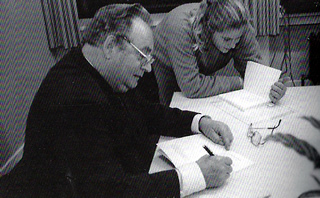
Fernand Handtpoorter (4 januari 1933 - 5 augustus 2007)
De Duitse dichter en schrijver Andreas Altmann werd geboren in Hainichen (Sachsen) op 4 januari 1963. Zie ook alle tags voor Andreas Altmann op dit blog.
das dorf
die sterne über den wolken erfinden sich
augen, die durch sie aufsteigen. sie entfernen,
sie schließen sich. die gärten wachsen zurück
in die wiesen an beiden seiten der steine,
die eine straße unter sich begraben. sie liegen
in den sätzen fest, die ihre seiten gewechselt haben.
an den laternen baumeln die gelöschten lichter.
die zeiger der kirchenturmuhr hängen an ihrer zeit.
solange es regen und wind zulassen,
weisen die dächer sie ab. nur die worte
der toten sind noch die häuser. der morgen
ist der abend ist der mittag ist die nacht.
schritte, die an tiere erinnern, sind das geflüster
der bäume über die holzwege. gesetzte segel
halten in ihnen stimmen gefangen, die aus
dem nachbarort gelingen. vor dem himmel
tauschen die farben ihre namen. die lippen
bleiben rot, verbergen sich. nur im winter, so heißt es,
unter dem schnee kommt das skelett des friedhofs
zum vorschein, als würde es sich bewegen.
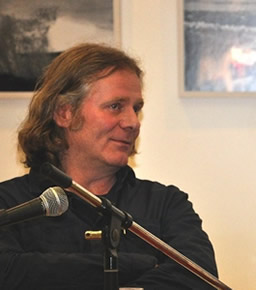
Andreas Altmann (Hainichen, 4 januari 1963)
De Amerikaanse schrijfster en biografe Doris Kearns Goodwin werd geboren op 4 januari 1943 in New York. Zie ook alle tags voor Doris Kearns Goodwin op dit blog.
Uit: The Bully Pulpit
“The essence of Roosevelt’s leadership, I soon became convinced, lay in his enterprising use of the “bully pulpit,” a phrase he himself coined to describe the national platform the presidency provides to shape public sentiment and mobilize action. Early in Roosevelt’s tenure, Lyman Abbott, editor of The Outlook, joined a small group of friends in the president’s library to offer advice and criticism on a draft of his upcoming message to Congress. “He had just finished a paragraph of a distinctly ethical character,” Abbott recalled, “when he suddenly stopped, swung round in his swivel chair, and said, ‘I suppose my critics will call that preaching, but I have got such a bully pulpit.’ ” From this bully pulpit, Roosevelt would focus the charge of a national movement to apply an ethical framework, through government action, to the untrammeled growth of modern America. Roosevelt understood from the outset that this task hinged upon the need to develop powerfully reciprocal relationships with members of the national press. He called them by their first names, invited them to meals, took questions during his midday shave, welcomed their company at day’s end while he signed correspondence, and designated, for the first time, a special room for them in the West Wing. He brought them aboard his private railroad car during his regular swings around the country. At every village station, he reached the hearts of the gathered crowds with homespun language, aphorisms, and direct moral appeals. Accompanying reporters then extended the reach of Roosevelt’s words in national publications. Such extraordinary rapport with the press did not stem from calculation alone. Long before and after he was president, Roosevelt was an author and historian. From an early age, he read as he breathed. He knew and revered writers, and his relationship with journalists was authentically collegial. In a sense, he was one of them. While exploring Roosevelt’s relationship with the press, I was especially drawn to the remarkably rich connections he developed with a team of journalists—including Ida Tarbell, Ray Stannard Baker, Lincoln Steffens, and William Allen White—all working at McClure’s magazine, the most influential contemporary progressive publication. The restless enthusiasm and manic energy of their publisher and editor, S. S. McClure, infused the magazine with “a spark of genius,” even as he suffered from periodic nervous breakdowns.“

Doris Kearns Goodwin (New York, 4 januari 1943)
De Amerikaanse dichter en schrijver Max Forrester Eastman werd geboren op 4 januari 1883 in Canandaigua, N.Y. Zie ook alle tags voor Max Eastman op dit blog.
Uit: Leon Trotsky. The Portrait of a Youth
“Trotsky never lived in the big stone house that testifies to the wealth of his parents. He was born and grew up to the age of ten in a little old-fashioned peasant's hut, with a fat brown roof of straw and five tiny rooms with low ceilings. The sitting-room and dining-room had wooden floors, and the floor in the sitting-room was painted; and here there were comfortable chairs, a table, an immense square stove, and on top of the stove a great big sleepy-eyed cat.
In the winter time, when it is impossible to work all day long and all the evening too, his mother sits reading with quiet concentration the words in a book. The process interests him because she whispers the words as she reads. He is cutting out the letters of the alphabet and sticking them fast in the frost on the window, one in each pane, and each little window has six panes. He is sticking them accurately in the middle, you may be sure. It is all snowy white outside, and the drifts curve half way up the low windows, and it is all warm inside, and tender and friendly and unworried.
The elder brother and sister will explain to him about the letters and give him his first colored books to read. And then when they are gone away to school he will be taken over to an aunt's house in the village, and he will stay there studying with her children. Nominally he will stay all winter, but as a matter of fact he will be at home most of the time, because he is so sweet-tempered and has such merry dimples that his parents cannot get along without him. In the summers an uncle from Odessa will come to visit them, and he too will give lessons to this gifted child with the beautiful manners and the blue light shining out of his eyes. Everybody who sees him will help him, and he will have every opportunity to rise to a place of respectability and comparative honor in Russian society.“

Max Eastman (4 januari 1883 – 25 maart 1969)
De Duitse schrijver Markus Seidel werd geboren op 4 januari 1969 in Wilhelmshaven. Zie ook alle tags voor Markus Seidel op dit blog.
Uit:Und alle Zeit der Welt
“Im Hamburger Abendblatt vom 29. Juni war Folgendes zu lesen:
Wer hat sie gesehen?
Spurlos verschwunden sind seit der Nacht vom 2. auf den 3. Juni die 29-jährige Simone Hoss, der gleichaltrige Heinrich Klein sowie der 31-jährige Peter Amendt, unterwegs in einem blau-metallicfarbenen Mini-Cooper mit dem Hamburger Kennzeichen HH-MS 3969.
Simone Hoss ist 1,68 Meter groß, hat kurze schwarze Haare und trug ein rotes Kleid und braune Schuhe. Heinrich Klein ist 1,83 Meter groß, hat kurze dunkle Haare, er trug einen dunkelblauen Anzug und schwarze Schuhe. Peter Amendt ist 2,03 groß, hat schulterlange braune Haare und trug eine beige Hose und ein schwarzes Sakko mit braunen Schuhen. Sachdienliche Hinweise nimmt jede Polizeidienststelle entgegen.
*
In der letzten Zeit habe ich manchmal gedacht, dass bald alles wieder gut wird. Für einen kurzen Moment war ich mir ganz sicher, tausendprozentig sicher. In diesen kurzen, wunderbaren Augenblicken hatte ich jedes Mal ein Bild vor Augen, und zwar einen großen, ruhigen See mit spiegelglatter Oberfläche. Nichts regt sich auf diesem See und nichts bewegt sich. Ich meine, es schwimmen keine Enten darauf herum oder so etwas. Er ist nur groß und ruhig, der See, sehr groß und sehr ruhig, und seine Oberfläche ist ganz glatt.
Und manchmal – bei einem grandiosen Satz in einem Buch, nach einem ganz bestimmten Musikstück im Radio oder einem Film im Kino –, manchmal habe ich tatsächlich die Vorstellung, jetzt fängt alles neu an, das ganze Leben beginnt sozusagen von vorn, und alles Vorherige ist null und nichtig und endgültig vorüber. Dann aber – kaum lese ich weiter, kaum drehe ich das Radio aus oder komme aus dem Kino und höre die ersten Sätze der Leute im Bus oder in der U-Bahn – weiß ich doch wieder: Alles ist bloß Illusion und leere Hoffnung. Alles bleibt vorerst so, wie es ist. Da kann ich machen, was ich will. Das Leben geht weiter. Es geht immer weiter, und eben das ist das Unfassbare.
Doch ich habe alle Zeit der Welt. Irgendwann wird wieder alles funktionieren. So wird es sein, da bin ich mir ganz sicher. Irgendwann wird es wieder so sein, dass es funktioniert.”
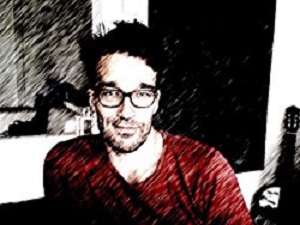
Markus Seidel (Wilhelmshaven, 4 januari 1969)
Zie voor nog meer schrijvers van de 4e januari ook mijn blog van 4 januari 2015 deel 1 en eveneens deel 2 en deel 3.
|



